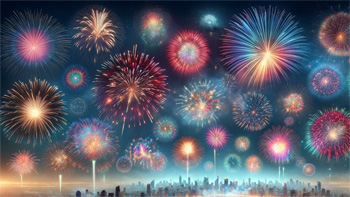 New Year's Day in Germany
New Year's Day in Germany


New Year's Day in Germany, known as 'Neujahr,' is a celebration steeped in rich traditions and modern customs. As the first day of the year, it is a public holiday across the country, marked by a spirit of renewal and hope. From the bustling streets of Berlin to the quaint towns along the Rhine, New Year's Day in Germany is a reflection of the country's cultural diversity and historical heritage, offering a unique blend of ancient customs and contemporary festivity.
The Historical Significance of Neujahr
The celebration of New Year's Day in Germany has evolved over centuries, incorporating elements from various cultural and historical influences. The day's significance goes beyond just marking the beginning of a new year; it is deeply rooted in German folklore and tradition. Ancient customs, many of which are still observed today, are intertwined with Christian beliefs, creating a unique cultural tapestry that defines New Year's celebrations in Germany.
Traditional Celebrations and Customs
One of the most enduring customs is the practice of 'Bleigießen' (lead pouring), where molten lead is dropped into cold water to form shapes that are interpreted to predict the future. Another traditional activity is watching 'Dinner for One,' a British comedy sketch that has become a New Year's Eve staple on German television. Fireworks are a significant part of the celebration, with spectacular displays lighting up the night sky across the country, symbolizing the driving away of evil spirits and the welcoming of good fortune.
Family Gatherings and Feasting
New Year's Day in Germany is also a time for family gatherings and feasting. Traditional foods such as 'Neujahrskuchen' (New Year's cakes) and 'pfannkuchen' (German doughnuts) are enjoyed. Families come together to share meals, reflecting on the past year and expressing hopes and resolutions for the year ahead.
Public Celebrations and Events
Apart from private celebrations, New Year's Day is marked by various public events and festivities. Parades, concerts, and special events are organized in cities and towns, drawing crowds eager to celebrate the start of the year. Berlin's Brandenburg Gate hosts one of the largest New Year's Eve parties in Europe, featuring live music, entertainment, and a countdown to midnight.
Outdoor Activities and Winter Sports
For many Germans, New Year's Day is an opportunity to enjoy the outdoors and engage in winter sports. Skiing, snowboarding, and ice-skating are popular activities, particularly in the Bavarian Alps and other mountainous regions. Nature walks and hikes are also common, with people taking to the trails to enjoy the serene beauty of the German landscape in winter.
New Year's Day in Germany is a vibrant and multifaceted celebration, reflecting the nation's love for tradition and its embrace of modernity. Whether it is through ancient customs like 'Bleigießen,' lively family gatherings, or grand public celebrations, the day is imbued with a sense of joy, reflection, and anticipation for what the new year holds. As Germany continues to evolve, so too does the celebration of New Year's Day, making it a dynamic and integral part of the country's cultural identity.